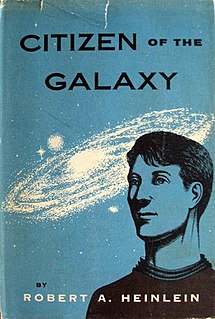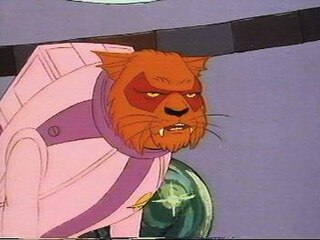An android is a humanoid robot or other artificial being often made from a flesh-like material. Historically, androids were completely within the domain of science fiction and frequently seen in film and television, but recent advances in robot technology now allow the design of functional and realistic humanoid robots.

John Kilian Houston Brunner was a British author of science fiction novels and stories. His 1968 novel Stand on Zanzibar, about an overpopulated world, won the 1969 Hugo Award for best science fiction novel, and the BSFA award the same year. The Jagged Orbit won the BSFA award in 1970.

Do Androids Dream of Electric Sheep? is a dystopian science fiction novel by American writer Philip K. Dick, first published in 1968. The novel is set in a post-apocalyptic San Francisco, where Earth's life has been greatly damaged by a nuclear global war, leaving most animal species endangered or extinct. The main plot follows Rick Deckard, a bounty hunter who is tasked with "retiring" six escaped Nexus-6 model androids, while a secondary plot follows John Isidore, a man of sub-par IQ who aids the fugitive androids.

Citizen of the Galaxy is a science fiction novel by American writer Robert A. Heinlein, originally serialized in Astounding Science Fiction and published in hardcover in 1957 as one of the Heinlein juveniles by Scribner's. The story is heavily influenced by Rudyard Kipling's Kim.

Dangerous Visions is a science fiction short story anthology edited by American writer Harlan Ellison and illustrated by Leo and Diane Dillon. It was published in 1967.

Robert Silverberg is an American author and editor, best known for writing science fiction. He is a multiple winner of both Hugo and Nebula Awards, a member of the Science Fiction and Fantasy Hall of Fame, and a Grand Master of SF. He has attended every Hugo Awards ceremony since the inaugural event in 1953.

Stand on Zanzibar is a dystopian New Wave science fiction novel written by John Brunner and first published in 1968. The book won a Hugo Award for Best Novel at the 27th World Science Fiction Convention in 1969, as well as the 1969 BSFA Award and the 1973 Prix Tour-Apollo Award.

Kate Wilhelm was an American author. She wrote novels and stories in the science fiction, mystery, and suspense genres, including the Hugo Award–winning Where Late the Sweet Birds Sang. Wilhelm established the Clarion Workshop along with her husband Damon Knight and writer Robin Scott Wilson.

The Bight of Benin or Bay of Benin is a bight in the Gulf of Guinea area on the western African coast.

Theodore Edwin White is a Hugo Award-winning American science fiction writer, editor and fan, as well as a music critic. He writes and edits as Ted White. In addition to books and stories written under his own name, he has also co-authored novels with Dave van Arnam as Ron Archer, and with Terry Carr as Norman Edwards.

Tower of Glass is a science fiction novel by American writer Robert Silverberg, published in 1970. It was nominated for the Nebula Award in 1970, and for both the Hugo and Locus Awards in 1971.

The Jagged Orbit is a science fiction novel by British writer John Brunner. It is similar to his earlier novel Stand on Zanzibar in its narrative style and dystopic outlook. It has exactly 100 titled chapters, which vary from several pages to part of one word. It was first published in 1969 with cover art by Leo and Diane Dillon, in the Ace Science Fiction Specials line issued by Ace Books.

The West Africa Squadron, also known as the Preventative Squadron, was a squadron of the British Royal Navy whose goal was to suppress the Atlantic slave trade by patrolling the coast of West Africa. Formed in 1808 after the British Parliament passed the Slave Trade Act 1807 and based out of Portsmouth, England, it remained an independent command until 1856 and then again 1866 to 1867.

"The Slaver Weapon" is the fourteenth episode of the first season of the American animated science fiction television series Star Trek: The Animated Series. It first aired on NBC on December 8, 1973, and was written by Larry Niven. It was based on his original short story "The Soft Weapon". This episode was expanded to become the first half of a full-length novel by science-fiction author Alan Dean Foster as Star Trek Log Ten.
Ace Science Fiction Specials are three series of science fiction and fantasy books published by Ace Books between 1968 and 1990. Terry Carr edited the first and third series, taking the "TV special" concept and adapting it to paperback marketing. The first series was one of the most influential in the history of science fiction publishing; four of the six novels nominated for 1970 Nebula Awards were from the series.
"The Lincoln Train" is an alternate history short story published by Maureen F. McHugh, published in April 1995. It is collected in volume 31 of the Nebula Awards anthologies, in Alternate Tyrants (1997), and in Best of the Best: 20 Years of the Year's Best Science Fiction (2005).

C. C. MacApp, pseudonym of Carroll Mather Capps was an American science fiction author. He was also a long-time benefactor of San Francisco chess. MacApp was a former president of the San Francisco Bay Area Chess League, and won the Northern California and San Francisco chess championship several times. He also wrote as Carroll J. Clem.

Nebula Science Fiction was the first Scottish science fiction magazine. It was published from 1952 to 1959, and was edited by Peter Hamilton, a young Scot who was able to take advantage of spare capacity at his parents' printing company, Crownpoint, to launch the magazine. Because Hamilton could only print Nebula when Crownpoint had no other work, the schedule was initially erratic. In 1955 he moved the printing to a Dublin-based firm, and the schedule became a little more regular, with a steady monthly run beginning in 1958 that lasted into the following year. Nebula's circulation was international, with only a quarter of the sales in the United Kingdom; this led to disaster when South Africa and Australia imposed import controls on foreign periodicals at the end of the 1950s. Excise duties imposed in the UK added to Hamilton's financial burdens, and he was rapidly forced to close the magazine. The last issue was dated June 1959.

Sunny South, an extreme clipper, was the only full-sized sailing ship built by George Steers, and resembled his famous sailing yacht America, with long sharp entrance lines and a slightly concave bow. Initially, she sailed in the California and Brazil trades. Sold in 1859 and renamed Emanuela, she was considered to be the fastest slaver sailing out of Havana. The British Royal Navy captured Emanuela off the coast of Africa in 1860 with over 800 slaves aboard. The Royal Navy purchased her as a prize and converted her into a Royal Navy store ship, Enchantress. She was wrecked in the Mozambique Channel in 1861.
Brunner, John (1968). Into the Slave Nebula. Lancer Books, NY.
















